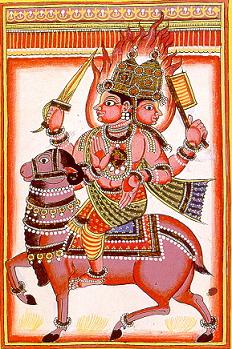Definition of Agni:
The definition of Agni is the Vedic god of fire and in a ceremonial and domestic way he is invoked through this element. Agni is part of the Vedic trinity of gods along with Indra and Surya. The Trimurti‘s appearance established him as a messenger between the gods and mortals. Additionally, people consider him as a protector of men and their homes. According to the Vāstu-śāstra literature, fire (Agni) is one of the primordial elements that form our reality. It is due to the five main elements that our world is full of life.

The spiritual liberation
In Hinduism, Agni refers to a person who achieves spiritual liberation and completes their religious duties. Hindus believe that such individuals develop a deep understanding of the true nature of oneself and the universe, attaining a higher state of consciousness. They attribute these individuals with greater wisdom and understanding. Symbolically, Agni illuminates the path to truth and wisdom and serves as the guardian of consciousness. Fire is essential in religious rites, and sacrifices are offered to seek protection and blessings. Additionally, it is a symbol of transformation and regeneration, capable of destroying the old to make way for the new.

Agni in fire ceremonies
In wedding ceremonies, couples typically circle around a sacred fire three times to seal their commitment. In addition, they invoke the gods by offering food and ghee (clarified butter). People also believe that Agni serves as a divine messenger, carrying the offerings to the gods.
Agni is a very important deity in Hinduism
In summary, Agni is a very important deity in Hinduism, not only for his role as the god of fire, but also for his significance in religious rites and ceremonies. In addition, people view him as the guardian of consciousness, the light that leads towards truth and wisdom, and the symbol of transformation and regeneration. He holds great spiritual symbolism.
You can help us by buying our Indian products in our shop on the following link.